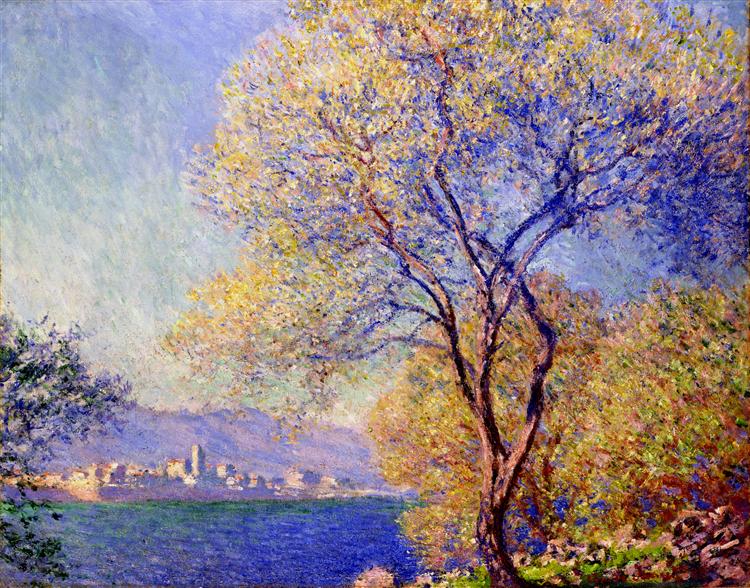Opis
Praca „Antibes widziana z Jardines de Salis 01” Claude Monet, utworzona w 1888 roku, zawiera esencję jednego z najbardziej fascynujących epizodów życia i kariery francuskiego malarza. Jako jeden z najważniejszych przedstawicieli impresjonizmu, Monet rozwija się w tym obrazie, przemówienie światła, koloru i śródziemnomorskiej atmosfery, charakteryzujące krajobraz, który w istocie jest zarówno konkretnym miejscem, jak i sensorycznym doświadczeniem.
Panoramiczny pogląd na antybierki, które rozwijają się na naszych oczach w tej pracy, jest żywym przejawem jego naturalnego środowiska. Monet używa palety bogatej w niebiesko -zielony, który oddaje niuanse nieba, wody i roślinności. Luźne i szybkie połączenie pędzla, charakterystyczne dla impresjonistycznego stylu, obserwuje się w każdym rogu kompozycji. Fale morza, narysowane przez płynne uderzenia, wydają się tańczyć na powierzchni, odsłaniając musowanie wody pod słońcem. Światło staje się bohaterem, wpływającym nie tylko na krajobraz, ale także widz, który jest zaproszony do poczucia ciepła dnia i świeżości morskiej bryzy.
Jardines de Salis, miejsce, z którego Monet przechwytuje ten obraz, również odgrywa kluczową rolę w pracy. Z ich bujną oferują idealny kontrast z ogromnym niebem i morzem. Roślinność, reprezentowana w zielonkawych tonach, rozciąga się na pierwszym planie, który umieszcza widza na scenie, prawie tak, jakby chodził przez sam ogród. Jednak obraz nie ma ludzkich postaci, co pozwala podejść do samej natury i jej interakcji ze światłem. Ta ludzka pustka zachęca do introspektywnej kontemplacji, w której piękno krajobrazu staje się duchowym schronieniem.
Ponadto Monet nie tylko stara się zilustrować miejsce, ale stara się wyrazić chwilę, uchwycając przemianę światła i koloru za pomocą swojej charakterystycznej techniki. Jego zdolność do przedstawienia wrażenia bezpośredniości jest szczególnie godna uwagi w sposobie, w jaki różne elementy pracy wydają się wibrować w odpowiedzi na światło. Ta szczególność, w której kolor jest mieszany i zestawiony w celu tworzenia efektów świetlnych, jest symbolem impresjonizmu i ujawnia zainteresowanie MONET dla percepcji wizualnej w najczystszej formie.
Kontekst, w którym utworzono tę pracę, jest również istotny. Monet, mijając sezony na Costa Azul, znalazła niewyczerpane źródło inspiracji w środowisku przeciwników. Ta praca, wraz z innymi krajobrazami tego samego regionu, podkreśla ewolucję techniczną w pracy Moneta, w której jego mistrzostwo w uchwyceniu naturalnego światła staje się bardziej wyrafinowane i poetyckie. Podobne obrazy, takie jak „drzewa migdałowe” lub „kobiety w ogrodzie”, wykazują tę samą fascynację efektem światła i natury, choć w różnych kontekstach.
„Antible widziane z ogrodów Salis 01” są ostatecznie świętowaniem efemerycznego piękna i świadectwem ewolucji impresjonizmu. Dzięki swojej harmonijnej kompozycji, mistrzowskie użycie koloru i skrupulatnej uwagi w świetle, Monet zaprasza widza do doceniania złożoności krajobrazu, który, choć zakotwiczony w określonym miejscu, wykracza poza to, że oferuje doświadczenie uniwersalną estetykę Jego dziedzictwo, naznaczone pragnieniem uchwycenia esencji życia przedstawionej w ulotnym momencie, znajduje w tej pracy jeden z jego najpiękniejszych wyrażeń.
KUADROS ©, słynna farba na ścianie.
Ręcznie wykonane obrazy olejne, z jakością profesjonalnych artystów i charakterystyczną pieczęcią KUADROS ©.
Usługa reprodukcji zdjęć z gwarancją satysfakcji. Jeśli nie jesteś w pełni zadowolony z repliki twojego obrazu, zwrócimy twoje pieniądze w 100%.

